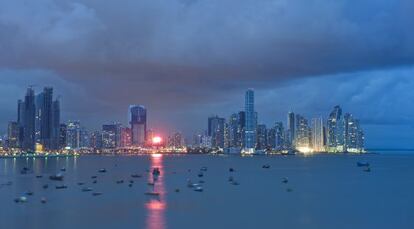Could Panama become the Singapore of Latin America?
The service sector drives 10-percent growth, but half the population is living in poverty

Over the course of the last decade, Panama has experienced the kind of rapid growth more usually associated with South East Asia: it is Latin America's fastest-growing economy, registering GDP growth of 10.6 percent last year, building on 9.2 percent in 2010. This watery isthmus, bridging Central America with the landmass of South America, has gone from being a sleepy backwater dependent on revenue from its canal to an economy increasingly driven by financial services.
The canal remains an important part of the country's economy, as does its shipping industry and the re-export zones around the canal.
But there are signs that the country's vertiginous expansion may not be sustainable. Many of the skyscrapers that have changed the skyline of the capital, Panama City, are empty, and there are growing suspicions about the origin of the money used to build them: this is a country with a long tradition of laundering cash.
Panama promotes itself as a bridge between the Americas, and a link between Asia and the West, the perfect location for international companies in the financial services sector, as well as transport and telecommunications. And there are a great many success stories that bear this out. At the same time, it is clear that the country's growth has been distributed unequally.
"It's true: Panama is the place to do business," says Tomás Drohan, the former chief engineer of the Panama Canal. "But wealth distribution is very poor: this country has one of the widest wealth gaps in Latin America, even if its per capita income is very high. This is something that could cause problems; in fact we are already seeing some issues related to this," he says.
"We have a significant percentage of the population that is basically unemployable, and they just don't figure in the official statistics. In some rural areas, where the indigenous population lives, 99 percent of the population lives in poverty," says Milton Henríquez, the leader of the opposition Popular Party. Of the country's 3.3 million people, 40 percent live in poverty. Just under a million people make up the workforce, with unemployment officially at five percent.
After Belize, which gained independence from the United Kingdom in 1981, Panama is Latin America's youngest nation, only separating from Colombia in 1903 under pressure from the United States, which took over a strip of land, with the idea of holding on to it in perpetuity. The US then set about building the Canal between 1904 and 1914. At the same time, it built a huge military base in the country, effectively making it a colony.
Panama's democracy is also relatively recent. It was invaded by the United States in 1989 to overthrow Manuel Noriega, a military man trained by the United States who had continued the military rule imposed by General Omar Torrijos after a coup in 1968. During this time, the country had become a major transshipment point for cocaine produced in neighboring Colombia. The last US soldiers did not leave the country until the Canal was finally returned to Panamanian authority in 1999. For much of the 1990s, the country's fragile democracy developed, albeit largely dominated by populist politicians.
Tu suscripción se está usando en otro dispositivo
¿Quieres añadir otro usuario a tu suscripción?
Si continúas leyendo en este dispositivo, no se podrá leer en el otro.
FlechaTu suscripción se está usando en otro dispositivo y solo puedes acceder a EL PAÍS desde un dispositivo a la vez.
Si quieres compartir tu cuenta, cambia tu suscripción a la modalidad Premium, así podrás añadir otro usuario. Cada uno accederá con su propia cuenta de email, lo que os permitirá personalizar vuestra experiencia en EL PAÍS.
¿Tienes una suscripción de empresa? Accede aquí para contratar más cuentas.
En el caso de no saber quién está usando tu cuenta, te recomendamos cambiar tu contraseña aquí.
Si decides continuar compartiendo tu cuenta, este mensaje se mostrará en tu dispositivo y en el de la otra persona que está usando tu cuenta de forma indefinida, afectando a tu experiencia de lectura. Puedes consultar aquí los términos y condiciones de la suscripción digital.








































